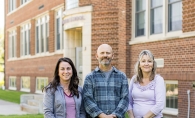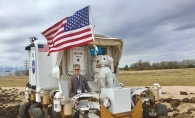Pop in on a Stillwater Rotary meeting, and you’ll frequently hear from a guest speaker or two. One such visit from a representative of MacPhail Center for Music in Minneapolis inspired the group to invest in a three-year, integrated music pilot program, Music Means More, at Lake Elmo Elementary.
Research shows the benefits of music exposure in early childhood go far beyond developing a mean rendition of “Chopsticks.” A study by the Royal Conservatory showed that music contributes to early cognitive development by forming stronger connections between different parts of the brain. There’s quicker language development, and it can even build memory and longer attention spans, because kids can more easily focus on a tune than the multitude of other signals coming at them.
There’s also an achievement gap often present between students from low-income or non-English-speaking homes and those from dominant-culture or higher-income homes. Because of language barriers and other stressors, students fall behind early in school and often never catch up, says Mary Planten-Krell, a Rotary member who’s been integral to implementing the program. In Lake Elmo schools, she says, about one in three families do not speak English as their first language, with more than 17 languages as the first language spoken at home. Music, because it’s non-language-based, can build teamwork and greater connections between students. “Lake Elmo fits the demographic we were looking for, plus it has a great, supportive principal and kind teachers,” Planten-Krell says. In partnership with MacPhail and the Stillwater School District, the Rotary worked with Lake Elmo teachers to identify where rhythm and tunes could be incorporated into existing curricula for all subject areas.
“We thought, ‘If students are missing musical opportunities and support at home, what if we could provide that?’ ” says Rex Cattanach, another Rotary member involved in the project. “It’s not just learning to read notes, but engaging the social and emotional aspects of music.”
His own kids, Seth, 18, and twins Nathan and Sara, 25, were involved in music in the Stillwater school district, and he saw how it affected their development. “There’s a social connection to school that’s evident in sports and other extracurriculars. But to make music, you have to coordinate the work you do more than any other area,” Cattanach says.
This past year, kindergarteners, the first to take part in the program, attended the Stillwater Vagabonds concert given annually for the Rotary. The room was filled with pizzas and almost 100 kids, some of whom could be seen moving their hands and “conducting” the choir, Cattanach says. It exposed the kids to older, inspiring musicians, and it showed the Rotary members the impact of their time and money.
Outside of the classroom and sporadic field trips, the students are given supplies for a take-home project. “The goal isn’t to make musicians out of all of these kids or identify talent, but to help with brain development and social skills,” Planten-Krell says. “Through music, students gain a sense of empathy for others ... It leads to success in life, regardless of what [students] do.”
“This program is not just about seeing the kids who need help,” Cattanach adds. “This is a vehicle, a modality, for raising the bar for learning. Period.”
The Music Means More program at Lake Elmo might be getting some updates this year. Learn more about the participants at the website here.









